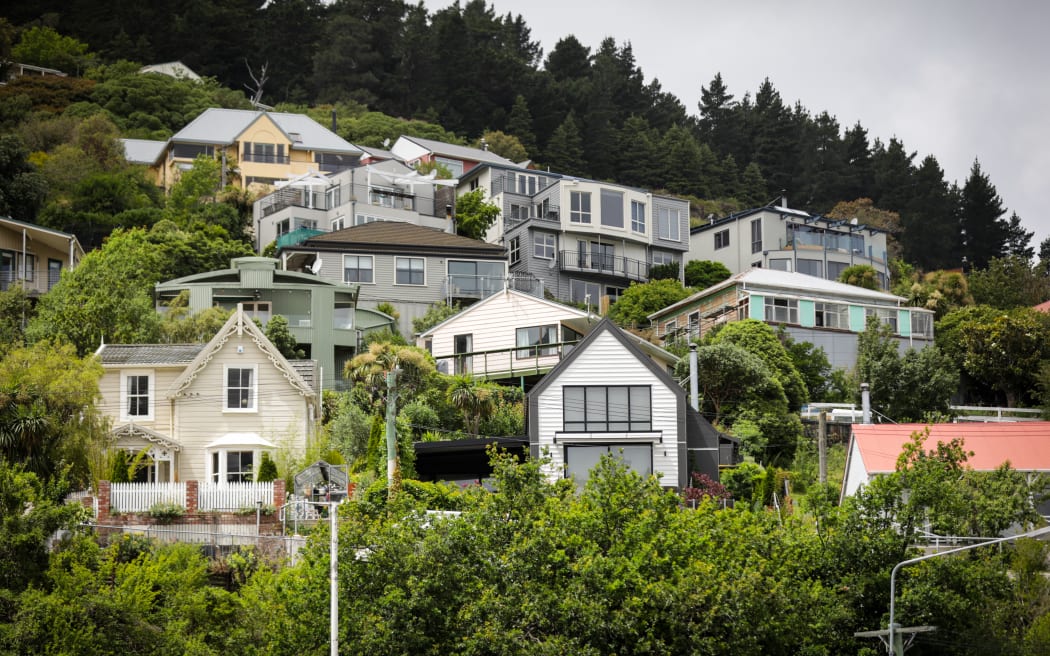Navigation for News Categories
By Susan Edmunds of 
First-home buyers have to save for more than nine years, on average, to secure a deposit. File photo.
Photo: RNZ / Nate McKinnon
Buying houses has become something only rich people do, one economist says, and it will take a combination of efforts to help fix the country’s housing issues.
Corelogic data shows that, although housing affordability has improved since 2021, when prices peaked, it is still stretched due to high interest rates.
Mortgage repayments as a percentage of gross annual household income were at 49 percent in the fourth quarter of last year. Since the first quarter of 2022, this measure has been in a range of 49 percent to 52 percent. Before that, the highest reading was 46 percent in 2007-2008.
The long-term average is 37 percent.
Properties are now valued at seven times the average household income. Corelogic chief property economist Kelvin Davidson said that was an improvement from a peak of 8.6 in early 2022 but above the long-term average of 5.9.
Tauranga was the most expensive by this measure at 8.5.
Reserve Bank data showed that the average household income for first-home buyers was $152,700 in September last year, up from $145,800 a year earlier.
The annual average New Zealand household income from all sources is $132,496 and the median is $115,000.
Economist Shamubeel Eaqub said housing was not affordable for anyone who was middle income.
“Those who are buying homes are those on higher incomes or who already have wealth. Why we have seen the trend of home ownership fall is not that housing is unaffordable and we’re spending more and more of our income – we are, but more people are being locked out of home ownership.”
The data showed the average income of first-home buyers borrowing at a debt-to-income ratio of at least six was $133,000.
“These are not young people on moderate incomes…. they are rich people who are first-home buyers because we’ve filtered out everyone else.
“Imagine the deposit you have to save up, how hard that was and the proportion of income going on mortgage repayments. What’s the quality of your life, but what’s the alternative? How else do you access the tenure security, financial security that owning a home gives you?
“We all know the benefits but it’s available to fewer and fewer people.”
Davidson said the “years to save a deposit” measure was 9.3 in the last quarter of last year, down from the worst point of 11.5 in the first quarter of 2022. But it was well above the long-term average of 7.9 years.
Tauranga has the longest period of time required to save a deposit at 11.3 years, followed by Auckland at 10.3 years.
Davidson said stretched housing affordability itself would tend to be a natural handbrake on the rate of house price growth.
“It’s conceivable that prices may only rise roughly in line with incomes over the next few years. That wouldn’t necessarily see affordability improve, but it might not get much worse either.”
He said mortgage rates were likely to drift lower within the next two years.
“This may throw that delicate balance between prices and incomes off course a little, pushing up measures such as the value-to-income ratio.
“However, when it comes to actually servicing debt, lower mortgage rates would obviously be beneficial for affordability. Debt to income ratio restrictions also have the potential to restrain house price growth over the medium term.”
Eaqub said the country would need to build more homes and work out how to make renting more acceptable in the meantime.
“When we talk about building houses there’s an idea that as you build expensive new homes, the older housing stock will filter down to poorer people and become more affordable but that hasn’t happened. Rents are expensive, too.
“When we think about building out of the crisis which has been gathering pace for 30, 40 years, we have to ensure that a portion of the new homes we build are for rentals, or are retained for social housing and affordable housing. Otherwise what we’re telling people who don’t have the income and the wealth is sorry, you wait, live in misery for your generation.”
He said there were signs of improvement but there was a sense that the system was “so broken” that no one thought it would be fixed soon.
This story was originally published on Stuff.
Get the RNZ app
for ad-free news and current affairs


>>> Read full article>>>
Copyright for syndicated content belongs to the linked Source : RNZ – https://www.rnz.co.nz/news/business/509241/first-home-buyers-are-rich-people-economist











